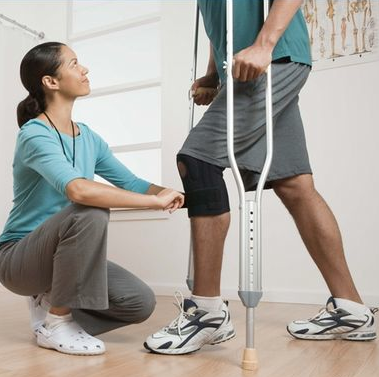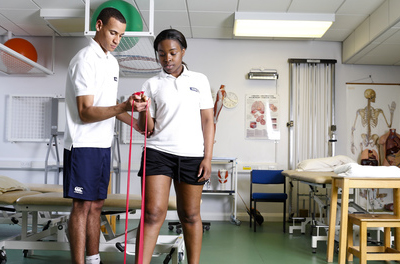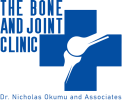Physiotherapy
Injuries can happen at any moment—on the playing field, in the workplace, in your car or even in your own home. Without proper diagnosis and timely care, recovery can often become a slow and painful process. Physical therapy uses a variety of treatments and physical exercises to begin the rehabilitation process at the onset of injury or pain. Through these treatments and exercises, physical therapy can efficiently and effectively strengthen your body, reduce pain and prevent future injury.
When daily life is altered due to an injury, accident, chronic medical condition or re-injury, a physical therapist can help get you back to the activities you enjoy. You will be evaluated by a licensed physical therapist to determine range of motion, muscle strength, postural alignment and abnormalities in movement patterns, body mechanics and quality of movement with daily activities.
Following the results of your evaluation, a personalized plan of care will be designed to help you meet your individual recovery needs. Together, we will establish clear goals and begin treatment that will be most effective to your specific injury.
Physical therapy program can provide significant benefits to the following conditions:
- Back and neck pain
- Headaches
- Carpal Tunnel Syndrome
- Muscle, myofascial and joint pain
- Sprains and strains
- Orthopaedic injuries
- Pre- and post-operative conditions
- Weakness or loss of motion
- Soft tissue injuries
- Osteoporosis
- Body misalignments (scoliosis)/Spinal dysfunctions
- Chronic pain / Fibromyalgia
- Stroke
- Sports-related injuries
- Work-related injuries
- Balance disorders



Physiotherapy Services
McDonald Wandere specializes in a comprehensive range of physiotherapy services tailored to meet the diverse needs of patients and healthcare institutions. These services include:
1) Musculoskeletal Physiotherapy: Musculoskeletal physiotherapy services focus on the assessment, diagnosis, and treatment of conditions affecting the muscles, bones, joints, ligaments, and tendons. Through personalized treatment plans, that aim to alleviate pain, improve mobility, and enhance function, facilitating the recovery and rehabilitation process for individuals with orthopedic injuries, arthritis, and other musculoskeletal disorders.
2) Cardiorespiratory Physiotherapy: Cardiorespiratory physiotherapy services are designed to optimize respiratory function and cardiovascular health in individuals with pulmonary conditions, cardiovascular diseases, and other respiratory disorders. Using evidence-based interventions such as breathing exercises, airway clearance techniques, and aerobic training, help patients enhance their lung capacity, improve oxygenation, and achieve better overall cardiovascular fitness.
3) Sports and Orthopedic Rehabilitation: Tailored specifically for athletes and individuals recovering from sports-related injuries or orthopedic surgeries, sports and orthopedic rehabilitation services focus on restoring optimal function, strength, and mobility. Through specialized exercise programs, manual therapy techniques, and sport-specific training, we support athletes in their journey to recovery and help them return to peak performance safely and efficiently.
4) Pediatric Physiotherapy: Pediatric physiotherapy services cater to the unique needs of children and adolescents, addressing developmental delays, neurological conditions, musculoskeletal disorders, and congenital disabilities. With a child-friendly approach and specialized interventions, which aim to promote motor development, improve mobility, and enhance the overall quality of life for pediatric
patients and their families.
5) Neurorehabilitation Physiotherapy: Neurorehabilitation physiotherapy services focus on restoring function and independence in individuals with neurological conditions such as stroke, spinal cord injuries, traumatic brain injuries, multiple sclerosis, and Parkinson’s disease. Through specialized rehabilitation techniques, task-specific training, and neuroplasticity-based interventions, which strive to optimize neurological recovery, enhance motor control, and improve functional outcomes for patients living with neurological impairments.
6) Pelvic Floor Physiotherapy: Pelvic floor physiotherapy services address pelvic floor dysfunction, including conditions such as urinary incontinence, pelvic organ prolapse, pelvic pain, and sexual dysfunction. Utilizing a combination of manual therapy, biofeedback, therapeutic exercises, and lifestyle modifications, which assist patients achieve better pelvic health, restore bladder and bowel control, and alleviate symptoms related to pelvic floor disorders.

